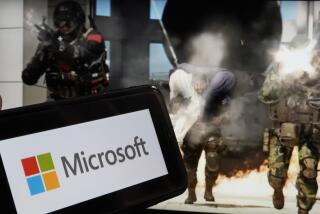Judge Questions Potency of Microsoft Sanction
- Share via
A key element of the antitrust settlement that Microsoft Corp. negotiated with the Bush administration isn’t working as effectively as hoped, the government and the trial judge acknowledged Friday.
The criticism came just weeks before a U.S. appeals court considers tougher sanctions against the world’s largest software company.
U.S. District Judge Colleen Kollar-Kotelly urged government lawyers during a court hearing to investigate in the next few months why only nine companies had paid Microsoft to license its Windows technology for their own software products.
One of the most important provisions of the landmark settlement compels Microsoft to permit competitors to license parts of its technology to build products that seamlessly communicate with computers running Windows software.
“I think all of us had hoped for more agreements,” Kollar-Kotelly said. “I am interested in finding out why we don’t have more licensed products.”
The judge said the nine companies “look like it’s pretty much the heavy hitters.”
Government lawyers said it would take months to determine whether the deals would substantially keep Microsoft from abusing its control over Windows computers.
The judge scheduled another oversight hearing for January.
The licensing requirement was considered central because it would prevent Microsoft from locking out rival companies developing products that compete with Microsoft’s own. Under the court-approved agreement, which expires in November 2007, Microsoft must offer such licenses under “reasonable and nondiscriminatory terms.”






